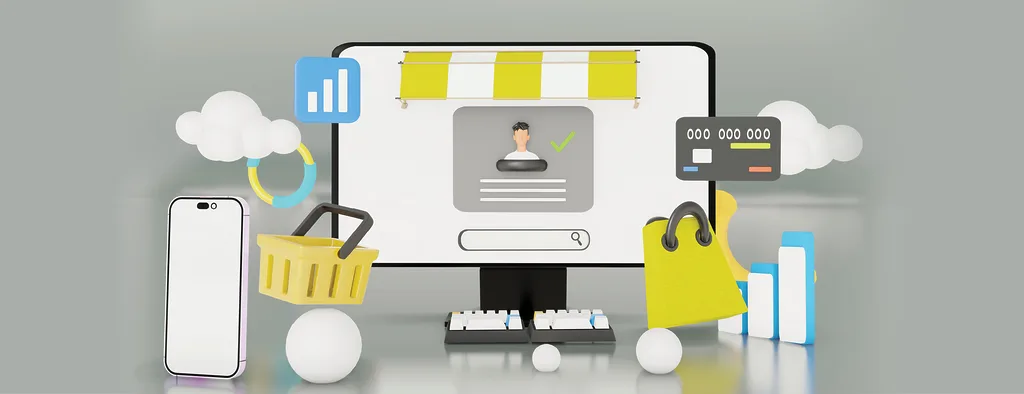Table of contents
- Delving into the Essence of E-commerce: The Digital Transactional Ecosystem
- A Detailed Look at the Multifaceted Activities Within E-commerce
- Exploring the Expansive Domain of E-business: The Integrated Digital Enterprise
- The Defining Distinction: A Matter of Scope, Focus, and Integration
- Key Takeaways
- Need Expert Guidance?
- Conclusion
- FAQs
In the contemporary business landscape, the internet has become an indispensable infrastructure, fundamentally reshaping how organizations operate, interact with their stakeholders, and generate revenue. Within this vast digital expanse, two terms frequently surface – e-commerce and e-business. While often employed interchangeably in casual discourse, a nuanced understanding reveals that they represent distinct yet interconnected concepts with varying scopes and implications for organizational strategy and operations. To truly harness the transformative power of the internet, businesses must grasp the fundamental difference between e-commerce and e-business, recognizing their individual roles and how they collectively contribute to a comprehensive digital presence and operational efficiency. This in-depth exploration will meticulously dissect these two critical concepts, illuminating their unique characteristics, outlining their constituent activities, and providing a clear framework for distinguishing between them, presented with illustrative tables for clarity.
Delving into the Essence of E-commerce: The Digital Transactional Ecosystem

E-commerce, an abbreviation for electronic commerce, focuses specifically on the digitally mediated exchange of goods and services between various parties. It is the transactional arm of a business’s online presence, directly concerned with facilitating buying and selling activities through internet-based platforms. Think of e-commerce as the virtual marketplace, the digital storefront where customers and businesses interact to complete commercial transactions. Its primary emphasis is on the revenue-generating activities that occur online.
A Detailed Look at the Multifaceted Activities Within E-commerce
| E-commerce Activity | Description | Examples |
| Business-to-Consumer (B2C) Online Retail | Businesses selling directly to individual consumers via websites or marketplaces. | Amazon, Flipkart, Myntra, a brand’s own online store |
| Business-to-Business (B2B) E-commerce | Online commercial transactions between two or more businesses. | Alibaba, industry-specific online marketplaces for suppliers and buyers |
| Consumer-to-Consumer (C2C) Online Marketplaces | Platforms enabling individual consumers to buy and sell directly from each other. | eBay, Etsy, classifieds websites |
| Online Auctions and Bidding Platforms | Sale of goods/services through a dynamic bidding process. | eBay Auctions, specialized auction websites |
| Digital Products and Services | Selling and delivering intangible goods and services online (e-books, software, streaming). | Selling software licenses online, Netflix subscriptions, online course platforms |
| Secure Online Payment Gateways | Processing financial transactions securely over the internet. | Integration with PayPal, Stripe, Razorpay, etc. |
| Online Ticketing & Reservations | Purchasing tickets for events, travel, or booking services online. | BookMyShow, airline booking websites, hotel reservation platforms |
| Transaction-Related Customer Support | Assisting customers with queries related to their online purchases (order tracking, returns). | Online chat support for an e-commerce website, email support for order issues |
Exploring the Expansive Domain of E-business: The Integrated Digital Enterprise
E-business, in contrast to the transactional focus of e-commerce, represents a more holistic and encompassing approach to conducting all aspects of a business through the utilization of internet and digital technologies. It views the internet not just as a sales channel but as a fundamental infrastructure that can optimize and transform virtually every business process, both customer-facing and internal. E-business aims to leverage digital tools to enhance efficiency, improve communication, streamline operations, and ultimately drive overall business value.
ALSO READ | 7 Effective Strategies for Social Media Marketing Success
A Comprehensive Overview of the Diverse Activities Within E-business
| E-business Activity | Description | Examples |
| All E-commerce Activities | All online buying and selling of goods and services. | (Refer to the E-commerce Activities table above) |
| Supply Chain Management (SCM) | Utilizing online platforms to manage the flow of goods and information between suppliers, manufacturers, and distributors. | Online procurement systems, vendor portals, collaborative platforms for production planning and logistics |
| Customer Relationship Management (CRM) | Employing online systems to manage customer interactions, personalize communications, and enhance customer service. | Salesforce, Zoho CRM, HubSpot CRM |
| Enterprise Resource Planning (ERP) | Integrating various business processes (accounting, HR, inventory) through online systems. | SAP, Oracle NetSuite, Microsoft Dynamics 365 |
| Online Marketing and Advertising | Utilizing digital channels (social media, email, SEO, SEM) to promote the business. | Running Facebook ad campaigns, sending email newsletters, optimizing website for search engines |
| Human Resources Management (HRM) | Managing employee information, payroll, benefits, and recruitment through online platforms. | HRIS (Human Resource Information Systems) software, online recruitment platforms |
| Online Communication & Collaboration | Using email, instant messaging, video conferencing, and collaborative document sharing for internal and external communication. | Slack, Microsoft Teams, Zoom, Google Workspace |
| Online Procurement | Sourcing goods and services from suppliers through online platforms. | Using online marketplaces for business supplies, e-tendering platforms |
| Online Customer Education | Providing online resources (FAQs, tutorials, knowledge bases) to educate customers. | A software company providing online tutorials for its products, a retailer offering online guides on product usage |
💡 Pro Tip: If you want to start an online business but have too many doubts, connect with a online business expert from Boss Wallah for guidance – https://bw1.in/1116
The Defining Distinction: A Matter of Scope, Focus, and Integration

The core difference between e-commerce and e-business hinges on their respective scope, primary focus, and the level of integration within the overall business operations.
| Feature | E-commerce | E-business |
| Scope | Narrower: Primarily online commercial transactions (buying & selling). | Broader: All business activities conducted electronically (internal & external). |
| Primary Focus | Facilitating and optimizing online transactions; revenue generation. | Leveraging digital technologies to improve overall business efficiency and performance across all functions. |
| Integration | Can exist as a standalone function. | Inherently implies a greater degree of integration of digital technologies across various business functions. |
| Key Activities | Online retail, B2B/C2C sales, digital products, online payments, etc. | Includes all e-commerce activities + SCM, CRM, ERP, online marketing, HRM, online communication, etc. |
| Perspective | Largely external, focused on customer interactions for sales. | Holistic, encompassing both external customer interactions and internal operational processes. |
Illustrative Analogy: The Comprehensive Business Ecosystem
Consider a large physical retail corporation with an online presence:
- E-commerce would be analogous to the online store (website or app) where customers can browse products, add them to their cart, and make purchases. It’s the direct point of sale in the digital realm.
- E-business would represent the entire digital infrastructure that supports the corporation’s operations, including not only the online store but also the online systems used for managing inventory across all warehouses and physical stores, the CRM system used by customer service agents across phone, email, and chat, the online platform used for communication with suppliers, the company’s internal intranet for employee communication and HR functions, and the digital marketing campaigns used to drive traffic to both the online and physical stores.
Key Takeaways
- E-commerce is a subset of e-business, focusing specifically on online commercial transactions (the buying and selling of goods and services).
- E-business is a broader term encompassing all business activities conducted electronically over the internet, including e-commerce and various internal and external operational processes.
- The primary focus of e-commerce is on revenue generation through online sales and customer-facing transactions.
- The primary focus of e-business is on leveraging digital technologies to improve overall business efficiency, streamline operations, and enhance performance across all functions.
- E-commerce can function as a standalone activity, while e-business necessitates a more integrated approach, weaving digital tools into the fabric of the entire organization.
- Understanding the distinction is crucial for businesses to develop comprehensive digital strategies that encompass both revenue generation and operational excellence.
Need Expert Guidance?
Starting a business can be challenging, but you don’t have to do it alone! At Boss Wallah, our 2,000+ business experts are ready to provide valuable insights and guidance. Whether you need help with marketing, finance, sourcing, or any other area of any business, our business experts are here to help you succeed- https://bw1.in/1116
Confused about Which Business to Start?
Want to start your own business but unsure which one to choose? Explore Boss Wallah, where you’ll find 500+ courses by successful business owners, featuring practical, step-by-step guides on starting and growing various businesses.
Find your perfect business idea today – https://bw1.in/1111
Conclusion
In the digital age, both e-commerce and e-business are vital for organizational success. While e-commerce serves as the crucial engine for online revenue generation through direct buying and selling, e-business provides the overarching digital framework that supports not only these transactions but also a wide array of internal and external processes. By recognizing the fundamental difference between e-commerce and e-business, businesses can move beyond a siloed approach to online activities and cultivate a holistic digital strategy that optimizes efficiency, enhances customer experiences, and ultimately drives sustainable growth in the interconnected global marketplace. Embracing the full potential of e-business, with a robust e-commerce strategy at its core, is no longer optional but a necessity for navigating the complexities and capitalizing on the opportunities of the digital realm.
FAQs
- Is every business with a website an e-commerce business?
- Not necessarily. A business with a website that primarily provides information but does not facilitate online sales is engaged in e-business but not necessarily e-commerce.
- Can a business have e-commerce without e-business?
- It’s challenging. Even a basic e-commerce operation requires some level of e-business infrastructure for order processing, customer data management, and potentially supply chain interactions.
- Which is more important for a modern business: e-commerce or e-business?
- Both are crucial and interconnected. E-commerce drives revenue, while e-business provides the efficient operational backbone to support and scale those sales and other business functions.
- What are some examples of e-business activities that are not e-commerce?
- Examples include online supply chain management, internal communication platforms, online HR management systems, and online procurement processes that don’t directly involve selling to end consumers.
- How has the rise of mobile technology impacted e-commerce and e-business?
- Mobile technology has significantly boosted both by making online transactions more accessible (mobile e-commerce) and enabling more flexible and real-time management of various business processes (mobile e-business).
- What role does data analytics play in e-commerce and e-business?
- Data analytics is vital for both. In e-commerce, it helps understand customer behavior and optimize sales. In e-business, it provides insights into operational efficiency, supply chain performance, and overall business strategy.
- How does social media relate to e-commerce and e-business?
- Social media can be a powerful tool for driving traffic to e-commerce platforms and for broader e-business activities like marketing, customer engagement, and brand building.
- As a small business owner, where should I focus my initial efforts: e-commerce or e-business?
- It often makes sense to start with establishing a functional e-commerce presence to generate revenue, while simultaneously implementing basic e-business tools for customer management and operational efficiency.


